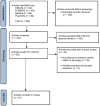The sexuality and sexual experiences of forensic mental health patients: An integrative review of the literature
- PMID: 36226109
- PMCID: PMC9548579
- DOI: 10.3389/fpsyt.2022.975577
The sexuality and sexual experiences of forensic mental health patients: An integrative review of the literature
Abstract
Introduction: Sexuality is an integral aspect of the human experience that defines an individual. Robust research, substantiated by the World Health Organization, demonstrates that healthy sexuality improves mental health and quality of life. Despite this level of global advocacy and clinical evidence, sexuality and sexual health as determinants of health have been largely overlooked in the mental healthcare of patients being treated under the requirements of a forensic order (forensic patients). In this review, the authors have evaluated the literature related to the sexual development, sexual health, sexual knowledge and risks, sexual experiences, sexual behavior and sexual desires of forensic patients to inform policy and clinical practice. Furthermore, the review explored how forensic patients' sexual healthcare needs are managed within a forensic mental healthcare framework. The paper concludes with recommendations for service providers to ensure that sexual health and sexuality are components of mental health policy frameworks and clinical care.
Methods: An integrative review was utilized to summarize empirical and theoretical literature to provide a greater comprehensive understanding of the sexuality and sexual experiences of forensic patients. This included identifying original qualitative, quantitative, or mixed-method research, case reports, case series and published doctoral thesis pertaining to the research topic.
Results: Twenty-one articles were selected for review. We grouped the review findings into three main themes: 1) Forensic patient themes, 2) Forensic mental health staff themes and 3) Forensic mental health organization themes. The review demonstrated scant information on the sexual healthcare needs of forensic patients or how health services manage these needs while the patient is in a hospital or reintegrating into the community.
Conclusion: There is a dearth of evidence-based, individualized or group approaches which clinicians can utilize to assist forensic patients to achieve a healthy sexual life and it is recommended that such services be developed. Before that however, it is essential to have a clear understanding of the sexual healthcare needs of forensic patients to identify areas where this vulnerable population can be supported in achieving optimal sexual health. Urgent changes to clinical assessment are required to incorporate sexual healthcare as a component of routine mental healthcare.
Keywords: forensic; integrative review; severe mental illness; sexual health; sexuality.
Copyright © 2022 Brand, Ratsch, Nagaraj and Heffernan.
Conflict of interest statement
The authors declare that the research was conducted in the absence of any commercial or financial relationships that could be construed as a potential conflict of interest.
References
-
- Kismödi E, Corona E, Maticka-Tyndale E, Rubio-Aurioles E, Coleman E. Sexual rights as human rights: a guide for the WAS declaration of sexual rights. Int J Sex Health. (2017) 29:1–92. 10.1080/1932017, 1353865 - DOI
-
- Huband N, Furtado V, Schel S, Eckert M, Cheung N, Bulten E, et al. . Characteristics and needs of long-stay forensic psychiatric inpatients: a rapid review of the literature. Int J Forensic Ment Health. (2018) 17:45–60. 10.1080/14999013.2017.1405124 - DOI
-
- Australian Institute of Health Welfare . Australia's Health 2016. Determinants of health. Canberra: AIHW
Publication types
LinkOut - more resources
Full Text Sources


